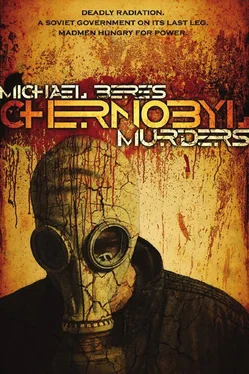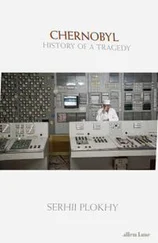Michael Beres - Chernobyl Murders
Здесь есть возможность читать онлайн «Michael Beres - Chernobyl Murders» весь текст электронной книги совершенно бесплатно (целиком полную версию без сокращений). В некоторых случаях можно слушать аудио, скачать через торрент в формате fb2 и присутствует краткое содержание. Жанр: Триллер, на английском языке. Описание произведения, (предисловие) а так же отзывы посетителей доступны на портале библиотеки ЛибКат.
- Название:Chernobyl Murders
- Автор:
- Жанр:
- Год:неизвестен
- ISBN:нет данных
- Рейтинг книги:4 / 5. Голосов: 1
-
Избранное:Добавить в избранное
- Отзывы:
-
Ваша оценка:
- 80
- 1
- 2
- 3
- 4
- 5
Chernobyl Murders: краткое содержание, описание и аннотация
Предлагаем к чтению аннотацию, описание, краткое содержание или предисловие (зависит от того, что написал сам автор книги «Chernobyl Murders»). Если вы не нашли необходимую информацию о книге — напишите в комментариях, мы постараемся отыскать её.
Chernobyl Murders — читать онлайн бесплатно полную книгу (весь текст) целиком
Ниже представлен текст книги, разбитый по страницам. Система сохранения места последней прочитанной страницы, позволяет с удобством читать онлайн бесплатно книгу «Chernobyl Murders», без необходимости каждый раз заново искать на чём Вы остановились. Поставьте закладку, и сможете в любой момент перейти на страницу, на которой закончили чтение.
Интервал:
Закладка:
“Chief Investigator Chkalov, is Detective Horvath a convinced or an unconvinced Communist?”
Chkalov’s smile changed to a frown. “These are questions of conscience. My men do their duty.”
Komarov sat forward, stared at Chkalov. “Surely you know your men. Especially a man like Detective Horvath who has been with you for many years. Is he convinced or unconvinced?”
“He’s not a Party member.”
“Party membership has nothing to do with it. I want to know if Detective Horvath, who originates from a frontier area and is of Hungarian descent, does his job simply to maintain his position, or if he does it for the good of the system.”
“He’s a hard worker,” said Chkalov, sounding defensive. “Detective Horvath is a bachelor and often makes use of his own time to solve a case.”
“Are you aware he has relatives in America?”
Chkalov smiled. “Many Ukrainians and Russians have relatives in America, so it would not surprise me if Detective Horvath has an American relative or two. Perhaps you should have visited the American consulate instead of coming here.”
Komarov ignored the smile. “A second cousin visited Detective Horvath here in the Ukraine while he was on holiday.”
“I know,” said Chkalov. “He told me about it.”
“Did you also know Detective Horvath associates with members of the artistic intelligentsia in Kiev?”
“He’s a lover of the arts,” said Chkalov. “Especially music.”
“Hungarians do love their music,” said Komarov. “Gypsy music.
Contrived emotion so they can alternately dance and weep.”
“What does this have to do with anything?” asked Chkalov.
Komarov glanced to Azef.
“Background data,” said Azef, obviously glad to join in. “Major Komarov is simply establishing Horvath’s character.”
“I suppose next we’ll go into his preferences in women,” said Chkalov.
“Perhaps,” said Azef.
Komarov nodded to Azef, a signal to continue.
“For instance,” said Azef, taking his notebook from his pocket.
“Were you aware Detective Horvath has been seeing a Miss Tamara Petrov, who is editor of a literary review known to publish the works of anti-Soviets?”
“A detective’s personal life is none of my business,” said Chkalov.
“A moment ago it was,” said Azef. “A moment ago you said Detective Horvath has much free time because he is a bachelor, and he uses this time to put in extra duty.”
“He doesn’t give up all his free time,” said Chkalov, obviously annoyed. “I simply meant he is often available on call.”
“He should be,” said Komarov. “He has a car at his disposal, which he is also permitted to use for personal trips.”
“It is valuable to have our detectives in their own cars, Major.
This is a large city, and a detective can be called to duty at a moment’s notice.”
“Do you also permit out-of-town trips?”
“Occasionally.”
“A hundred kilometers away?”
Chkalov sat forward, fists clenched on his desk. “I see no point to this questioning. If militia policy is in question, perhaps you would be candid enough to say it.”
“On the contrary,” said Komarov. “I don’t question militia policy. I simply want to inquire about several trips Detective Horvath made to Pripyat.”
Chkalov smiled. “Detective Horvath was visiting his brother.
Even so, there is a militia office in Pripyat, and it is not uncommon for our detectives to communicate with one another.”
“I’ve visited the Pripyat militia office myself,” said Komarov. “I must say, the captain there is also a person of interest. But we’re getting off track. I’m here to reveal information regarding Detective Horvath.”
“Please do!” said Chkalov abrasively.
“Detective Horvath’s brother holds a key position at the Chernobyl Nuclear Facility operated by the Ministry of Energy. The KGB is assigned to protect the facility. Recently, Detective Horvath’s brother has had personal problems and has been involved in gossip with co-workers, some of which involves the questioning of authority. In letters from Detective Horvath to his brother, Mihaly Horvath, Chernobyl matters were alluded to. Detective Horvath has subse-quently inquired whether these matters were resolved. Now, instead of writing, Detective Horvath has made several trips to Pripyat. Our concern, Chief Investigator Chkalov, is not with an individual’s personal life unless his personal life is dedicated to wrongdoing.”
Chkalov stood, walked to his window with his hands clasped behind him, then turned. “Detective Horvath is one of my best men. He would not be involved in wrongdoing.”
“I didn’t say he was,” said Komarov.
“Then what the hell are you getting at?”
“His brother,” said Komarov. “We’re concerned about his brother, and we’d like you to let us know if you hear anything. A compromised Chernobyl engineer is my concern.”
“Such methods you use,” said Chkalov, shaking his head. “In the militia, when we want to know an answer, we simply ask the question. But I suppose KGB procedures are different.”
“They have to be,” said Komarov. “In counterintelligence, there are times when we do not know the questions. We simply know a situation exists in which questions should be asked. In the KGB we do not wait for a crime to occur before we do something.”
When he and Azef walked through the anteroom after leaving Chkalov’s office, Komarov heard what sounded like the violent slamming of a desk drawer behind him. He turned to see Azef smiling gleefully like a fat-faced child.
Although the North Atlantic was over a thousand kilometers away beyond all of Europe, the distant ocean affected Kiev’s weather. In winter, northwesterly winds blew across Scandinavia, causing snow squalls, which sometimes paralyzed the city. But now, in late April, the winds had reversed their course, bringing warmth from the Black Sea.
It was evening, and Major Komarov was on the back porch of his small home on the outskirts of Darnitsa, a suburb of Kiev. This afternoon, Komarov had succeeded in intimidating Chief Investigator Chkalov of the Kiev militia. As he sat in the dark on his porch sipping vodka on ice with a lemon peel, he could still see Chkalov’s angry round face and Captain Azef’s smiling round face. Con-temptible brutes, both of them.
The porch faced a grove of trees bordering a creek at the southern edge of the yard. The south wind was fragrant with greenery, momentarily overpowering the smell of vodka and the acrid aroma of the cigarette he had just put out.
Dinner was finished, and Komarov could hear the muted bab-ble of the television inside the house. His wife remained captivated by television, while Komarov, weather permitting, spent evenings on his beloved porch. On the small wooden table beside his chair were cigarettes, a lighter, an ashtray, a bowl of ice, a peeled lemon, his glass, and his bottle.
When he sipped vodka, Komarov’s elbow brushed against his side where he felt the weight of the knife in the inside pocket of his jacket. Keeping the knife with him rather than locked away in his desk coincided with his introduction last summer to the suspicious actions of three Hungarians. Although he had not met them, the three had been under operational observation for many months, and Komarov felt he knew them well.
Two of the Hungarians, Mihaly Horvath and Juli Popovics, worked at the Chernobyl facility. If the need arose, the actions of these two would be of interest to the Ministry of Energy, to the power-plant Party secretary, or even to KGB headquarters in Moscow. Somehow Komarov felt this need would arise. He had been requested confidentially to watch for incidents in which Chernobyl personnel questioned safety at the plant. Although he did not know the reason, he felt a Moscow crackdown might come. If it did, he would be ready. He would have his three suspects: a Chernobyl engineer, a technician, and a detective in Kiev.
Читать дальшеИнтервал:
Закладка:
Похожие книги на «Chernobyl Murders»
Представляем Вашему вниманию похожие книги на «Chernobyl Murders» списком для выбора. Мы отобрали схожую по названию и смыслу литературу в надежде предоставить читателям больше вариантов отыскать новые, интересные, ещё непрочитанные произведения.
Обсуждение, отзывы о книге «Chernobyl Murders» и просто собственные мнения читателей. Оставьте ваши комментарии, напишите, что Вы думаете о произведении, его смысле или главных героях. Укажите что конкретно понравилось, а что нет, и почему Вы так считаете.












